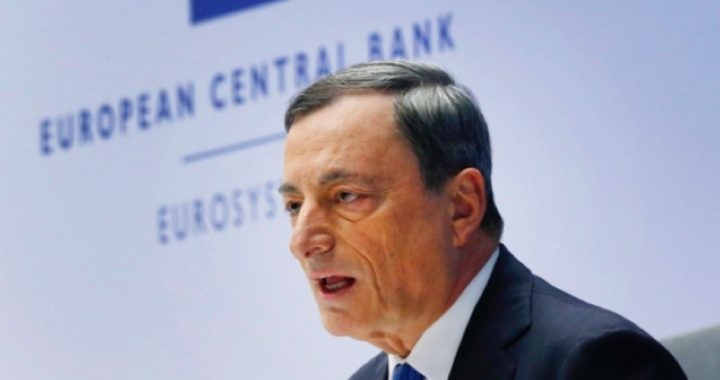
Last week, European Central Bank chief Mario Draghi (shown) tried to do an impression of former Federal Reserve Chairman Ben Bernanke. Although “Helicopter Ben” — he of the massive, innovative “stimulus” monetary policies enacted in response to the Great Recession, which pumped trillions of new dollars into the global economy — has been retired from the helm of the Fed for several years, he casts a very long shadow indeed. Draghi’s own newly enacted stimulus, designed to boost Europe out of persistent economic malaise, not only takes a few pages out of the Bernanke playbook, it moves central banking into entirely new, much more overtly socialist territory than even Bernanke could have envisioned.
For starters, the ECB has dropped interest rates to essentially zero, familiar ground for Americans interested in opening savings accounts or CDs over the last few years. Draghi’s ECB will also dramatically increase monthly bond purchases, much as Bernanke’s Fed did during the period of coyly named “quantitative easing.”
But the ECB, unlike the Fed and other central banks before now, will not be restricting its purchases of bonds to government issues.
So-called “open market operations,” invented by American banker Benjamin Strong (who was chief of the New York Federal Reserve Bank during the teens and 20s of the last century), have traditionally consisted of the purchase and sale of government-issued bonds like Treasuries from certain designated dealers, usually (though not always) on the secondary market. In other words, the Fed has ordinarily manipulated the money supply by selling or purchasing already-issued government securities on the secondary market (although it has occasionally purchased them, upon issuance, directly from the Treasury Department). Other central banks have traditionally conducted open market operations in a similar fashion. Such operations have created an economy of privilege, whereby certain megabanks and securities dealers authorized to deal directly with the Fed and other central banks in this way have priority of access to new credit and money thus created; put otherwise, a bank or investment firm that can buy and sell directly from the Fed (and there are typically only a handful of these, usually in money centers like New York and London) has an enormous advantage over those that cannot. It is these necessary points of privileged contact between central banks and the private bankers and financiers permitted to conduct their business that contribute to the socialization of monetary and financial systems.
Now Draghi has introduced a new wrinkle to “open market operations.” In addition to purchasing government-issued bonds, the ECB will now begin purchasing bonds issued by private corporations. The ramifications of this are enormous. For one thing, it will amount to a massive new subsidy of selected private corporations, which will immediately enjoy a gargantuan competitive advantage over others (including foreign competitors) whose bonds the ECB does not purchase. For another, it will greatly magnify the inflationary potential of the ECB. For a third, it will create perverse incentives for private corporations to issue more debt than they would otherwise do. And lastly, it will entail a partial de facto — if not de jure — takeover of the private sector by the ECU, since ownership of tranches of private corporate debt will give the central bank ascendancy over their finances.
This is financial socialism on an unprecedented scale, as the New York Post observed:
Will the ECB be buying bonds of Airbus, which is Boeing’s largest competitor in airline manufacturing? That has the potential to effectively enable the ECB to give unfair advantages to Continental companies looking for financing.
And will German automakers like Mercedes Benz, BMW or Volkswagen be sellers of bonds? The funding costs of these companies could be dramatically reduced, enabling them to sell their cars more profitably than American or Japanese manufacturers.
Draghi is also taking the unprecedented step of — in effect — subsidizing all loans by banks. It will now loan money to EU banks at zero percent interest, and will pay them to the tune of .4 percent of all euros lent. This means that it will be giving money to banks and paying them a bonus for all money loaned.
One of the enigmas of modern history is how Europe has been able to sustain so much socialism for so long without utterly imploding. As unemployment continues to spiral upward and Europe teeters dangerously close to another recession, there are signs that the continent that birthed Western civilization is near the point of no return. And, as has been the case for several generations across the Western world, the only response ever contemplated for the problems occasioned by socialism is more socialism.
New U.S. Fed Chairwoman Janet Yellen, whose policies have been a continuation of Bernanke’s, will doubtless be watching the ECB closely as it ventures into new socialist enterprises. Let us hope that she does not try to follow their example.
Photo of European Central Bank chief Mario Draghi: AP Images



